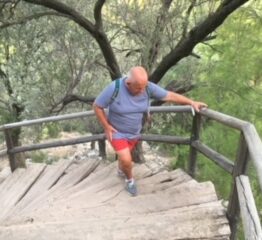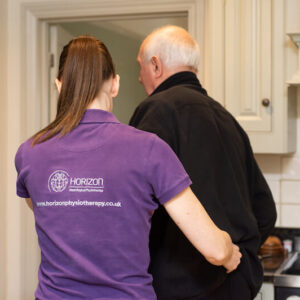“Karen showed me how much more I was capable of”
Eric Phillips suffered a stroke in 2017 at the age of 66 and was considered unlikely to ever walk again. Now 73, Eric has recently joined a gym and is one of many older clients rediscovering their love of exercise thanks to support from Horizon Rehabilitation.
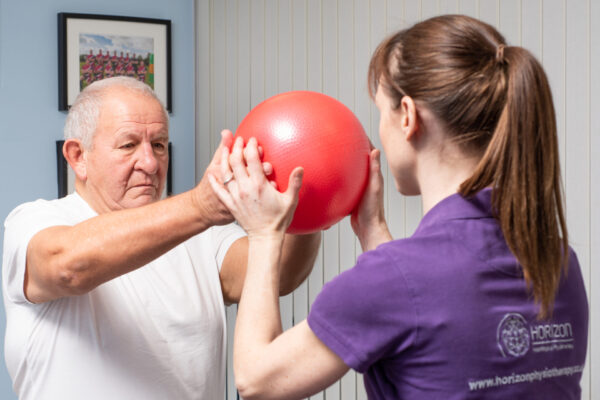
One evening in February, as he left the office and started walking towards his car, Eric realised that his right foot was not moving as it should – it was starting to flick and he had lost some sensation in it.
Thanks to the FAST campaign that had been shared on TV, Eric recognised the symptoms of a stroke and miraculously was able to call his own ambulance.
He recalls:
“My arms began to twitch and my face felt awkward. I thought “I know what this is”. I opened my car door and my phone engaged with my car. I was able to say “dial 999” and it did.
Somehow I also managed to send a text message to my son-in-law to say “come back, I think I’m having a stroke” even as my brain was starting to switch off.”
Eric was taken to the Stroke Unit at High Wycombe hospital, where a consultant told his wife, Barbara, “he won’t make the night”. When Eric did make it through the night, the consultant warned: “be prepared for the fact he is probably never going to walk again and possibly won’t talk again”.
Eric quickly beat the odds and came home, where he was visited regularly by a care team, including neuro physiotherapist Karen Blagojevic.
The start of a six-year journey
On her first visit, Eric confided to Karen that although he’d been advised by other healthcare staff not to try too much too soon, he had actually been walking around his home and letting go of his frame. And when Barbara wasn’t there, he’d even been up and down the stairs a couple of times!
To Eric’s surprise, Karen encouraged him to go for his first outside walk.
He said:
“We just hit it off from day one and Karen has looked after my care right the way through. Even now, when things take a dip, I just send a message and say, “I need to see you” and she makes sure I can get an appointment.”
Work-life balance
Eric believes there were two factors that contributed to his stroke. One was his general health, which had declined since he stopped playing and coaching sport, leading to weight gain. Secondly, he was under a lot of stress through this business.
Before his work became so consuming, Eric enjoyed playing football, rugby, cricket, squash, badminton and golf. He also made a huge contribution to up-and-coming young footballers, serving as a coach for over 30 years, both locally and at a high level.
He said:
“Coaching was a way of keeping fit, a way of unwinding and I had a great relationship with the players. The training was very disciplined and very structured, so for two or three evenings a week I was able to provide the lads with something they weren’t getting at home or at school: how to be a successful team.”
It was a desire to spend more time with his wife and family at weekends which led to Eric stepping down from his coaching role. But the space it left in his life was quickly consumed by work.
He said:
“I felt like I had done my job with the football coaching. I’d promised Barbara that I’d call it a day at the end of the season, and we’d start to enjoy life. I hadn’t intended to then rebuild a business at age 66…!”
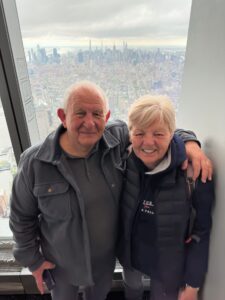
Making a comeback
Eric’s professional background is in the design and fit-out of commercial kitchens and restaurants. His past projects include refurbishing the grandmaster’s dining rooms at The Inner Temple – a private dining venue in London.
Eric is dyslexic and struggled throughout school without a diagnosis. In the 1980s, he applied his entrepreneurial spirit to managing pubs, “because you didn’t need to read or write to run a pub” and had three pub properties in his portfolio by the time he was 38. Over his career, Eric has experienced the highs and lows of building up a business and floating it on the stock market, only to see it taken down as the recession hit in the early 1990s.
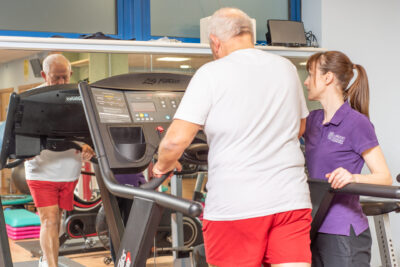
Eric believes that he has now found the right balance between running his business from home and leading a healthy life.
He continues to use his expertise at work, but outsources almost everything, leaving plenty of time to stay active and maintain the movement he’s recovered since his stroke.
He says:
“I’m 73 years old and I’ve been through the mill a bit of it. Finding life balance is just so important.”
Living with a neurological disorder
Like many people who have experienced a stroke, Eric is sometimes aware that his muscles are not behaving normally. They contract as though in response to a “blanket message” message from his brain, rather than a clear message to a specific muscle. For example, if he wants to send a message to his index finger, his neck, shoulder and arm all become active.
These ongoing neurological symptoms are affected by Eric’s general health and physical wellbeing, and can become more noticeable after coming into contact with somebody who’s got a cold or cough. (Eric usually knows a day or two before he gets a cough, because his muscles contract and I become slightly awkward.)
Eric is also very aware of how his mental health affects his neurological symptoms. He explains:
“Sometimes my muscles contract when I’m feeling stressed or something has upset me. So I’ve studied mindfulness and meditation and use various scanning methods to rebalance myself mentally. Taking these steps often sorts out the physical problems. Once I relax my brain, my muscles relax.”
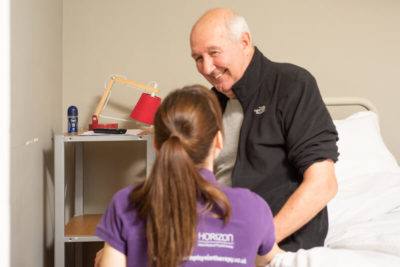
A personalised recovery programme
Karen and the Horizon team don’t just look at the physical aspect of stroke recovery. Eric’s memory has been affected by the degradation of his nerves, so Karen uses videos to remind him of the techniques he’s learned to manage his condition and all of the ways that he’s been able to adapt.
In the last few months, Eric has begun attending group activity sessions at the Court Garden Leisure Complex in Marlow, run by a fitness coach and therapists who specialise in supporting people with neurological disorders.
Karen says:
“It’s been great to see Eric joining the classes and for our team to help him maintain all the hard work he’s put in at home.”
On the up again
Since his recovery, the business opportunities that have come Eric’s way have exceeded all his expectations. At some point, Eric plans to hand his business over to his son-in-law, but he’s in no rush.
He said:
“Somebody wrote something on LinkedIn saying “Eric Phillips is back!” and straightaway a company that I used to do keynote speeches for got back in touch.
The fact that I’ve managed to achieve all the things I’ve done – both personally and in business – 90% of that is down to Karen.”
